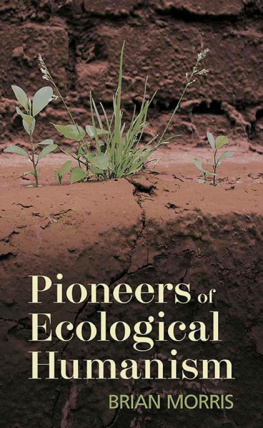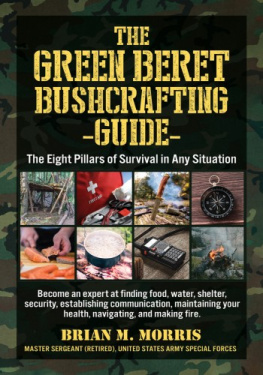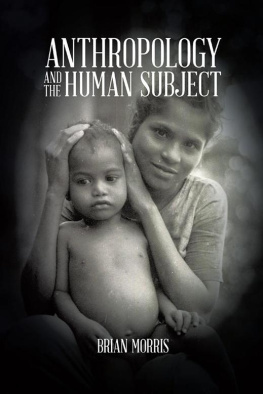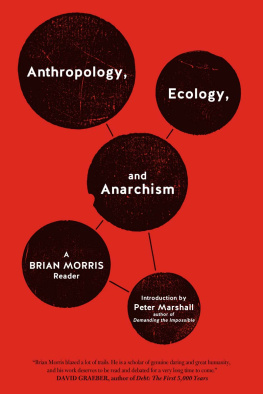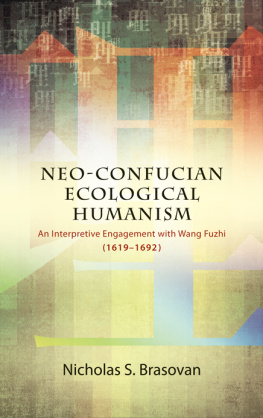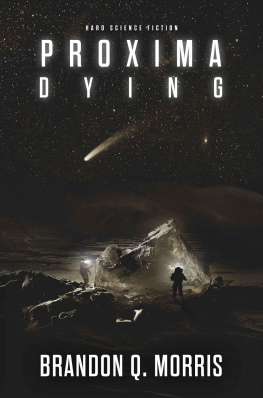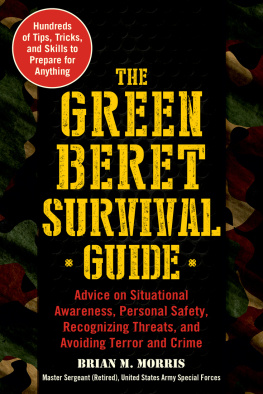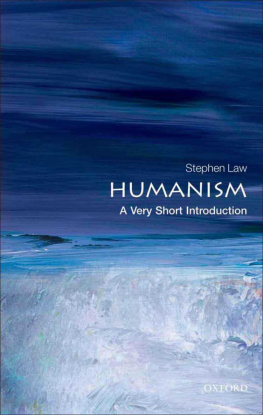Brian Morris - Pioneers of Ecological Humanism
Here you can read online Brian Morris - Pioneers of Ecological Humanism full text of the book (entire story) in english for free. Download pdf and epub, get meaning, cover and reviews about this ebook. year: 2012, genre: Science. Description of the work, (preface) as well as reviews are available. Best literature library LitArk.com created for fans of good reading and offers a wide selection of genres:
Romance novel
Science fiction
Adventure
Detective
Science
History
Home and family
Prose
Art
Politics
Computer
Non-fiction
Religion
Business
Children
Humor
Choose a favorite category and find really read worthwhile books. Enjoy immersion in the world of imagination, feel the emotions of the characters or learn something new for yourself, make an fascinating discovery.
- Book:Pioneers of Ecological Humanism
- Author:
- Genre:
- Year:2012
- Rating:4 / 5
- Favourites:Add to favourites
- Your mark:
- 80
- 1
- 2
- 3
- 4
- 5
Pioneers of Ecological Humanism: summary, description and annotation
We offer to read an annotation, description, summary or preface (depends on what the author of the book "Pioneers of Ecological Humanism" wrote himself). If you haven't found the necessary information about the book — write in the comments, we will try to find it.
Pioneers of Ecological Humanism — read online for free the complete book (whole text) full work
Below is the text of the book, divided by pages. System saving the place of the last page read, allows you to conveniently read the book "Pioneers of Ecological Humanism" online for free, without having to search again every time where you left off. Put a bookmark, and you can go to the page where you finished reading at any time.
Font size:
Interval:
Bookmark:
First published in Great Britain in 2012 byThe Book Guild Ltd
Pavilion View
19 New Road
Brighton, BN1 1UF
The right of Brian Morris to be identified as the author ofthis work has been asserted by him in accordance with theCopyright, Designs and Patents Act 1988.
All rights reserved. No part of this publication may be reproduced, transmitted, or stored in a retrieval system,in any form or by any means, without permission in writing from the publisher, nor be otherwise circulated inany form of binding or cover other than that in which it is published and without a similar condition being
imposed on the subsequent purchaser.Typesetting in Garamond byYHT Ltd, London
Printed and bound in Great Britain byCPI Group (UK) Ltd, Croydon, CR0 4YY
A catalogue record for this book is available fromThe British Library.
ISBN 978 1 84624 866 5
Part 1Lewis Mumford and Organic Humanism
Part 2Rene Dubos and Ecological HumanismPart 3The Social Ecology of Murray BookchinThroughout my life I have had three essential interests: intellectual interests,that is. The first is an absorbing fascination with natural history (ecology), andI have been exploring and enjoying natural landscapes and their wildlife sinceI was a boy. The second is anthropology. Although I was born and spent myearly years in the Black Country, it was my good fortune to have eightyouthful years working in Malawi as a tea-planter. I thus developed a deepfascination with the diversity of human cultures. Eventually, in my latethirties, I became an anthropologist. My third interest has been anarchism.This came about when I met, quite by chance at the age of twenty-nine, BillGate. He was an affable working-class bloke, rather large, bearded andBakunin-like, and he introduced me to radical politics. I have been ananarchist that is to say, a libertarian socialist ever since. All my writingsover the past forty years have, in one way or another, been interdisciplinary,as I have sought to bring these three interests together.
The three radical scholars discussed in this book have each, in differentways, deeply influenced my own thought. They were, like myself, interdisciplinary thinkers, for they attempted to integrate anthropology and thestudy of human culture, ecology and radical politics. They were truly pioneersocial ecologists, and key figures in the emergence of the ecology movementin the 1970s. And yet, sadly, they have largely been forgotten and are hardlymentioned in the halls of academia. They suffer, like Erich Fromm, fromwhat may be described as popular acclaim and academic neglect.
This book aims to affirm their intellectural stature and continuing relevance with respect to current debates concerning ecological issues, and theirplace in developing an alternative to what Lewis Mumford described as themegamachine of industrial capitalism.
Finally, I would like to thank Emma Svanberg for typing up my notes, andJonathan Ingoldby for his editorial input and helpful suggestions.Brian MorrisAugust 2011
Which road is the correct one, which is just? Is it the way of Confucius,of the Buddha, of Jesus Christ, Gandhi, Bertrand Russell? Or the wayof Alexander the Great, Genghis Khan, Hitler, Napoleon, PresidentJohnson?
(1972: 10)It is doubtful if Russell, a passionate sceptic and libertarian all his life, wouldhave been entirely happy being associated with reactionaries like Confucius,or religious mystics like the Buddha but this extract clearly and unambiguously depicts the false dilemma with which we are presented as soon aswe begin to discuss ecology. Either we have to side with religious mysticsand neo-pagans and cultivate a sacramental or spiritual attitude towardsnature, or we are alleged to align ourselves with the positivist tradition andmechanistic philosophy, with aggressive imperialism, industrial capitalismand agribusiness. In innumerable ecological texts the choice we are given isthus between either mechanism or spiritualism, either mammon (industrialcapitalism) or God (religion), between Cartesian philosophy with its dualisticmetaphysics and its emphasis on the technological mastery of nature, or socalled spiritual ecology which embraces some form of religious metaphysics
either neo-paganism, theism, pan(en)theism or mysticism. For example, ina recent text, which purports to offer a deep ecological vision, the choice weare presented with is either the prison house of urban industrial civilizationwith its accompanying ideologies, or primitivism entailing the wholesalerejection of technology, the affirmation of a hunter-gathering existence andthe embrace of neo-paganism tribal animism (Watson 1999).
What is lost in all this is that there is another ecological tradition thatrepudiates both mechanism and spiritualism, that while critiquing industrialcapitalism and the megamachine, along with its anthropocentric and dualisticparadigm, does not go to the other extreme and embrace primitivism andsome form of religious metaphysic. This is the tradition of organic or ecological humanism, a tradition that is particularly associated with three pioneersocial ecologists: Lewis Mumford, Rene Dubos and Murray Bookchin.
This book aims to provide a critical introduction to the ecological philosophy of these three important public intellectuals. Sadly neglected byenvironmental philosophers, they are the true pioneers not the likes ofBateson and Capra in the continuing development of a new philosophy ofnature, an ecological worldview, in the postwar years.
In this introduction I shall briefly review some of the essential themes thatemerge from the ecological writings of Mumford, Dubos and Bookchin.
Like many other scholars these social ecologists stress that there is anessential paradox at the heart of human life, for there is an inherent dualityin social existence, in that humans are an intrinsic part of nature, while at thesame time, through our conscious experience and our human culture, we arealso in a sense separate from nature. Mumford speaks of humans as living intwo worlds the natural world, and what all three scholars, followingCicero, call second nature human social and symbolic life which is withinfirst nature. Humans thus have a dual existence, in that they are simultaneously contemplative and active beings, both constituting (giving culturalmeaning to) and being actively engaged in the natural world.
Fully embracing Darwins evolutionary theory, Mumford, Dubos andBookchin emphasize that humans are a product of natural evolution, andthat there is therefore no radical dichotomy between humans and the naturalworld specifically, other life forms. All three scholars thus repudiateCartesian philosophy, with its dualistic metaphysics implying a radicaldichotomy between humans and nature, the body and the mind along withits atomistic epistemology, its anthropocentric ethic, which envisages thetechnological mastery of nature, as well as its mechanistic paradigm. Following Darwin, they emphasize that the world nature is not a machinebut an evolutionary process, which can only be understood by an organic,developmental way of thinking and a holistic (relational) epistemology. ThisBookchin describes as dialectical naturalism. All three scholars thereforestress the crucial importance of historical understanding, especially withregard to biology. Dubos indeed affirms that nothing in biology makes senseexcept in the context of history. They are therefore critical of much socialscience which tends to emphasize a radical dichotomy between culture andnature, and, in over-emphasizing the autonomy of culture, to even ignorebiology entirely in the understanding of social life. Mumford, Dubos andBookchin are, then, all committed evolutionary naturalists.
Font size:
Interval:
Bookmark:
Similar books «Pioneers of Ecological Humanism»
Look at similar books to Pioneers of Ecological Humanism. We have selected literature similar in name and meaning in the hope of providing readers with more options to find new, interesting, not yet read works.
Discussion, reviews of the book Pioneers of Ecological Humanism and just readers' own opinions. Leave your comments, write what you think about the work, its meaning or the main characters. Specify what exactly you liked and what you didn't like, and why you think so.

